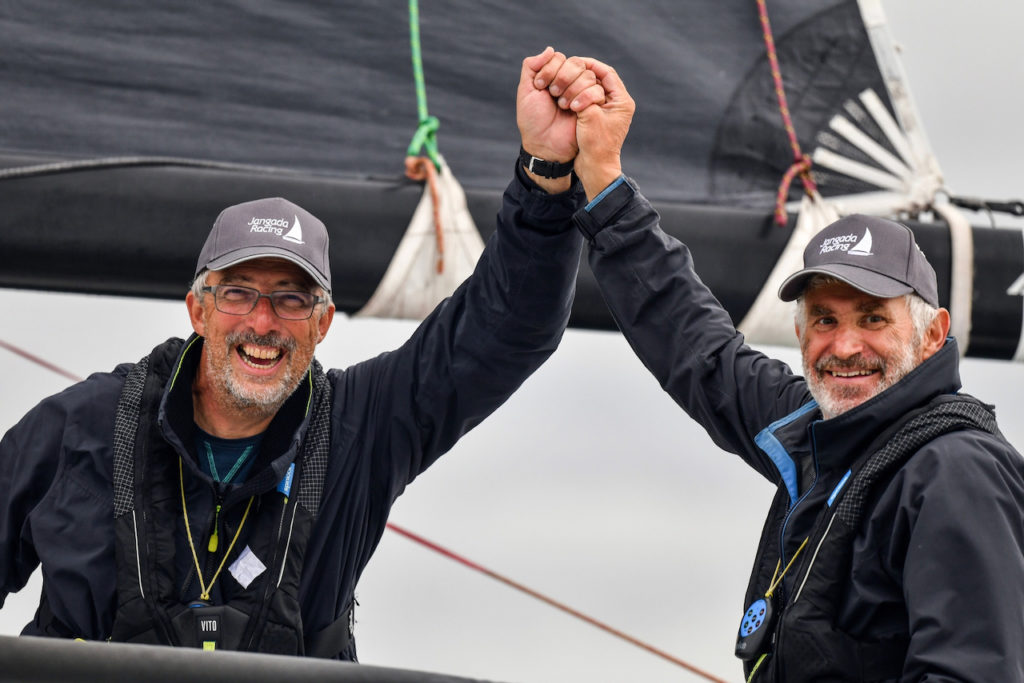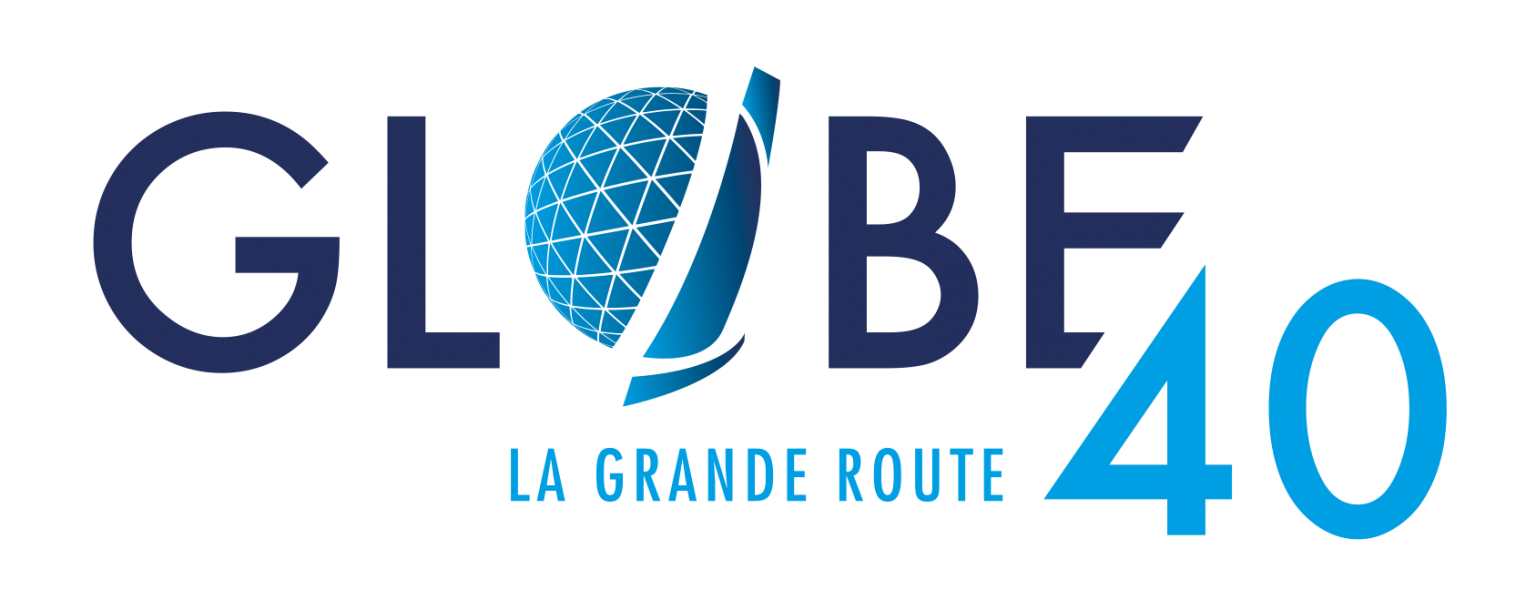
Richard Palmer and Rupert Holmes, who are entered in the 2nd edition of the Globe40, talk about their past sailing experience in the IRC and their dream of race around the world…
Before looking ahead to your participation in the Globe40 2025, could you tell us about your sailing career and past experiences?
Richard Palmer:
I started sailing at the age of 11 and before long was racing a Laser. As a teenager I took to windsurfing and started racing around the UK circuit. The passion for racing has stayed with me ever since. In my mid-20s I had the opportunity to race on a club boat, a Sigma 33 both one-design and cross channel races.
In 2006 I bought my own boat, a J109 and fairly soon discovered the joys of sailing 2-handed with a Fastnet campaign in 2009. Always looking for new challenges I entered the RWYC Round Britain & Ireland Race in 2010, the TWOSTAR Transatlantic Race in 2012 and returned to win the 2014 RWYC Round Britain & Ireland Race. It was during this race that I met Rupert, a rival that became my co-skipper for many subsequent races.
After switching to the JPK1010 in 2015 we set about to see if we could be the first 2-handed team to win the RORC IRC overall seasons points championships. The first attempt in 2018 was thwarted by rig failure in the final race. After winning the 2019 RORC Transatlantic with co-skipper Jeremy Waitt, COVID-19 curtailed our second attempt.
Rupert Holmes:
I have sailed almost all my life, starting in an Optimist when I was five, and have sailed close to 100,000 miles on 250 different boats. This includes racing yachts as diverse as Etchells, Quarter Tonners and TP52s, plus voyaging on an 80ft sloop from Auckland to Punta del Este, via Cape Horn, Ushuaia and the Falkland Islands.
When my partner, Kass Schmitt, bought a boat for solo and double handed offshore racing 10 years ago I was quicky hooked. Our first big race was the 2014 RWYC Round Britain & Ireland Race, when we won our class and were close to taking overall victory from Richard.
You both won the RORC Yacht of The Year in 2022. What does this prize represent?
Richard Palmer:
The RORC seasons championship is a huge undertaking if you opt to compete in all the races. For the IRC overall prize there are no discards so every race counts. The campaigns took us to Malta for the Rolex Middle Sea Race, Lanzarote for the RORC Transatlantic and Antigua for the Caribbean 600 race, as well as all the UK based races. Winning the Sevenstar Round Britain & Ireland Race against such a competitive IRC fleet was amazing. It’s an honour to be recognized by one’s peers with the Yacht of the Year award and a tribute to all those connected to Team Jangada for their commitment.
Rupert Holmes:
RORC runs the world’s biggest offshore racing programme, with larger fleets than any other race organised. It’s therefore a huge honour to finish the season as the most successful yacht – and in Jangada’s case the first double-handed boat to achieve this. But it’s something that can never be taken for granted – the sport is developing all the time and it’s great to see that many teams are making big leaps in performance every year. There is no guarantee we would achieve the same success if we decided to try again in 2024.
After several seasons in the IRC, you’re now starting on a Class40 campaign? What has motivated you in this choice and what are you looking for in this Class40 project?
Richard Palmer:
To an extent this is taking me back to my early days of racing in one design fleets. But it also satisfies a long-standing desire to race around the Globe. Unlike the non-stop editions with highly funded professional teams, this offers the opportunity for a Corinthian sailor to compete and visit some destinations along the way. I am looking forward to getting to know the Class 40 community and especially the camaraderie that will come from the fellow Globe 40 competitors.
Rupert Holmes:
It’s very simple: racing around the world is at the top of the bucket list for most enthusiastic offshore sailors. The Globe 40 is the only option to do so in a fleet of contemporary yachts outside the rarified (and very expensive) world of the Vendee Globe and The Ocean Race. I’m looking forward to a steep (and maybe never-ending) learning curve, as well as, hopefully, to making new friends along the way.
Let’s talk about the Globe40, where you’ve entered the 2nd edition. How did you get the idea of taking part in this round-the-world race?
Richard Palmer:
It turned out to be a very expensive curry night out in Cowes with Rupert who suggested it! Knowing that I wanted to race around the Globe I was easily persuaded and before long we were looking a Class 40s.
Rupert Holmes:
I know some of the competitors in the first edition of the Globe 40, so followed the race closely and was at the finish, where I interviewed all the teams for Yachting World magazine. Richard didn’t need any persuading – almost as soon as I talked about the race he agreed it’s something we should do.
How far have you got in preparing for this project? What is your sporting programme up to the start of the Globe40 in 2025?
Richard Palmer:
It is early days still. We bought the Class 40 in the Caribbean after it completed the TJV last year. Our first race will be the RORC Caribbean 600 with the aim to learn about racing Class 40s as quickly as possible. Paul Brandel who completed the TJV and knows the boat will be racing with us. As is Pip Hare who has complete the C600 before on a Class 40. Sadly, due to a recent eye injury I have had to pull out and RORC Commodore Deb Fish will be taking my place.
We have entered the Normandy Channel Race in September. Ahead of that we will base the boat in France and will look to participate in as many training events as possible with the Class. There is no substitute for sea miles so will look to enter as many events as time allows.
Rupert Holmes:
As Richard says, we are at a very early stage. There is much to be done to know and understand the boat, figure out how hard we can push it, maximise reliability, resilience and so on.
I imagine that you followed the 1st edition closely. What do you remember about this race and what was the highlight for you?
Richard Palmer:
With the lead boat winning by just two points it goes to show how exciting and close the racing can be.
Rupert Holmes:
The first edition of the Globe 40 was fascinating. It showed that both luck and meticulous preparation – but not necessarily the latest and most expensive boat – is essential. We believe we have a boat with the potential to win, but there’s a very long way between here and the start, yet alone the finish line.

